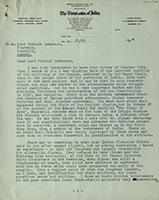Zona de identificação
Código de referência
Título
Data(s)
- c. 13 Oct. 1953 (Produção)
Nível de descrição
Dimensão e suporte
2 single sheets
Zona do contexto
Nome do produtor
Entidade detentora
História do arquivo
Fonte imediata de aquisição ou transferência
Zona do conteúdo e estrutura
Âmbito e conteúdo
‘The Times of India’, 4 Albemarle Street, London, W.1.—Defends his view of Jinnah’s rôle in the partition of India. Is convinced that Congress was largely responsible for alienating him.
—————
Transcript
The Times of India, London Branch:
4 Albemarle Street, London, W.1
Dear Lord Pethick Lawrence,
I was very interested to have your letter of October 13th. When I wrote to you I was thinking more of the narrower question of the splitting of the Punjab, referred to by Sir Henry Craik, than to the larger issue of the partition of India. Both form part of the same picture and it may be that in some respects Jinnah was only one factor in the circumstances which brought about partition. But he was a very important factor and his attitude, following the introduction of the new Constitution in 1937, was decisive. Every time the British Government faced the question of Indian political advancement, Jinnah demanded Pakistan and thus blocked agreement. You know more about what happened during the visit of the Cabinet Mission, but in Volume IV of the account of the Second World War entitled “The Hinge of Fate”, Churchill records that at the time of the Cripps Mission his Cabinet considered a plan to declare India a Dominion after the war. He was then faced with a note from Mr. Jinnah declaring that if any constitutional move was intended the Pakistan scheme must be accepted, a statement which was backed up by Sir Firoz Khan Noon, then a member of the Government of India. There is no doubt that Churchill was deeply impressed by these notes and sent them to President Roosevelt in justification of his attitude.
There may be something in what your Indian financier friend said to you after August 15, 1947, but my strong conviction—based on experience—is that the Congress was largely responsible for alienating Jinnah. They refused to take Jinnah and the Pakistan idea seriously. At the time of the famous Calcutta Unity Conference in the twenties, when Jinnah was still a Congressman at heart, they could have achieved an agreement with him on terms which would have preserved the unity of the country. From a logical point of view the Congress leaders, as I know, had justification for their attitude, but logic sometimes makes bad politics. I have no doubt British Governments in the past sometimes found Hindu-Moslem animosity very convenient, but on the need to preserve Indian unity there was always insistence, and I know that Viceroys like Halifax and Linlithgow were very strong on that point both in public and in private. I also know that many of my Indian friends took that same view as the Indian financier whom you quote, and one cannot say that it is entirely baseless. But I still feel that the main fault rested with the Congress mishandling of Jinnah, especially in the days when he was still a Congress supporter.
One or two people whom I met in the Club after your address, including Lord Hailey, agreed with me that you put up a very good case.
Yours sincerely,
Francis Low
(Sir Francis Low)
Avaliação, seleção e eliminação
Incorporações
Sistema de arranjo
Zona de condições de acesso e utilização
Condições de acesso
Condiçoes de reprodução
Idioma do material
Script do material
Notas ao idioma e script
Características físicas e requisitos técnicos
Instrumentos de descrição
Zona de documentação associada
Existência e localização de originais
Existência e localização de cópias
Unidades de descrição relacionadas
Zona das notas
Identificador(es) alternativo(s)
Pontos de acesso
Pontos de acesso - Assuntos
Pontos de acesso - Locais
Pontos de acesso - Nomes
- Low, Sir Francis (1893-1972), knight, journalist (Assunto)
- East India Association (Assunto)
- Jinnah, Mohamed Ali (1876-1948), creator of Pakistan (Assunto)
- Wood, Edward Frederick Lindley (1881-1959), 1st Earl of Halifax, politician and diplomat (Assunto)
- Hope, Victor Alexander John (1887-1952), 2nd Marquess of Linlithgow, Viceroy of India (Assunto)
- Churchill, Sir Winston Leonard Spencer (1874-1965), knight, Prime Minister (Assunto)
- Cripps, Sir Richard Stafford (1889-1952), knight, politician and lawyer (Assunto)
- Noon, Firoz Khan (1893-1970), Prime Minister of Pakistan (Assunto)
- Craik, Sir Henry (1846-1927), 1st Baronet, civil servant and author (Assunto)
- Roosevelt, Franklin Delano (1882-1945), 32nd president of the United States (Assunto)
- Hailey, William Malcolm (1872-1969), 1st Baron Hailey, administrator in India and writer on Africa (Assunto)
Pontos de acesso de género
Identificador da descrição
Identificador da instituição
Regras ou convenções utilizadas
Estatuto
Nível de detalhe
Datas de criação, revisão, eliminação
This description was created by A. C. Green in 2020.

